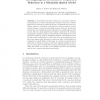Free Online Productivity Tools
i2Speak
i2Symbol
i2OCR
iTex2Img
iWeb2Print
iWeb2Shot
i2Type
iPdf2Split
iPdf2Merge
i2Bopomofo
i2Arabic
i2Style
i2Image
i2PDF
iLatex2Rtf
Sci2ools
ECAL
2007
Springer
2007
Springer
Investigating the Evolution of Cooperative Behaviour in a Minimally Spatial Model
It is well known that the evolution of cooperative behaviour is dependant upon certain environmental conditions. One such condition that has been extensively studied is the use of a spatially structured population, whereby cooperation is favoured by a reduced number of interactions between cooperators and selfish cheaters. However, models that address the role of spatial structure typically use an individual-based approach, which can make analysis unnecessarily complicated. By contrast, non-spatial population genetics models usually consist entirely of a set of replicator equations, thereby simplifying analysis. Unfortunately, these models cannot traditionally be used to take account of spatial structure, since they assume that interaction between any pair of individuals in a population is equally likely. In this paper, we construct as model that is still based on replicator equations, but where spatial localisation with respect to the number of interactions between individuals is inc...
Artificial Intelligence | Certain Environmental Conditions | ECAL 2007 | Replicator Equations | Spatial Structure |
Related Content
| Added | 07 Jun 2010 |
| Updated | 07 Jun 2010 |
| Type | Conference |
| Year | 2007 |
| Where | ECAL |
| Authors | Simon T. Powers, Richard A. Watson |
Comments (0)

